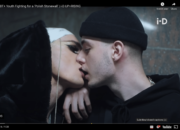
This new powerful I-D Video from director/producer Isolde Penwarden takes us inside the very unsettling situation of the LGBTQ community in Poland which over the past two years has seen its rights stripped away. In the east of the country, their very existence is outlawed with the creation of so many official LGBTQ-free zones. In early 2020 ILGA-Europe, a Brussels-based NGO Human Rights Organisation ranked Poland as the most homophobic country in the European Union.
However simply complying with all this authoritarian oppression is not an option for Poland’s queer generation Z, and they’re moving forth more powerfully than ever. This summer protests against the anti-LGBT sentiment spreading throughout the country lead to the arrest of a non-binary activist known as Margot, who claims she was threatened with death and locked up for being violent towards a security guard, with no real proof of such events occurring. She became the face of what’s being described as the country’s modern Stonewall movement, as the community as a whole band together to change things.
 In this new documentary, we get a deeper look into the everyday lives of queer people beyond the protests. We meet Avtomat, a queer DJ and activist who was there the day Margot was arrested and was also the victim of systemic scare tactics following his arrest. “All of the events made us know that we’re stronger than we think,” he tells us.
In this new documentary, we get a deeper look into the everyday lives of queer people beyond the protests. We meet Avtomat, a queer DJ and activist who was there the day Margot was arrested and was also the victim of systemic scare tactics following his arrest. “All of the events made us know that we’re stronger than we think,” he tells us.
The film crew was also invited into the world of Poland’s foremost voguing collective, the Kiki House of Sarmata. Founded in 2019, they’re one of the few groups embracing the inherently queer practise. “The Polish scene is a bit like Polish society,” they say, “in the sense that most people are white, and our minorities are mostly people from the east.” Still, their community acts as a pocket of queer revolution in a society that suppresses them.
There’s a chance to meet Margot face-to-face too, shortly after her release, as she explains what life is like in prison for a queer person during this fraught era in Poland’s history. The documentary also goes on to explore the familiar reality that nightclubs, full of vogue dancers and queer affection, become safe spaces away from the perils of the outside world.
The violence goes on, but with an incendiary sentiment of kinship at its core: Poland’s LGBT community isn’t going anywhere. “We will fight for ourselves,” Margo insists. And we should support them every inch of the way

